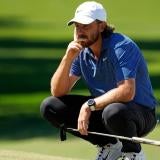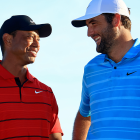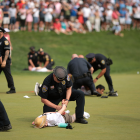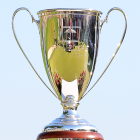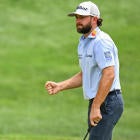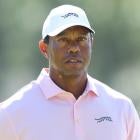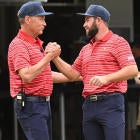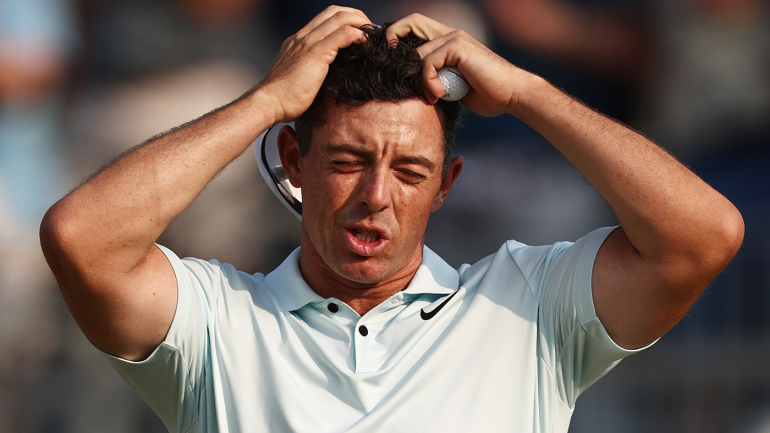
PINEHURST, N.C. -- The greatest showman in golf, Bryson DeChambeau, ruled Pinehurst No. 2 and the 2024 U.S. Open for three straight days. And then four-time major champion Rory McIlroy began to deconstruct the big top.
McIlroy turned a three-shot deficit into one by the turn, and with birdies at No. 1 and No. 9, he pushed the tournament into that existential place on the back side of a major where the golf seems almost secondary to what's being stirred up in the hands and heads and hearts of the contenders.
It's difficult just to get oneself to that place at a major, and McIlroy has done it so few times since he last won such an event in August 2014. So rarely has Rory realistically been in the hunt for history with nine holes still on the table.
If there is a criticism of his performance as a professional over the last decade, it is that: McIlroy is too good to have given himself so few rips at holding a silver trophy with two hours to go on a Sunday.
On this Sunday, the putts kept dropping in ways they had not in the past. One at the par-4 12th from 22 feet. Another on the short par-4 13th where he drove his tee shot over the back of the green. After four birdies across a five-hole stretch, McIlroy stood two clear of DeChambeau, who hit just four of his first 10 fairways.
The tent was billowing in the wind and its poles were wobbling on the interior.
It would be a new and refreshing experience for Rory to break somebody else's heart.
The Northern Irishman continued unloading driver after driver, piercing the thick, dusty U.S. Open-like air at one of the great venues in all of golf. McIlroy may have never hit that club better than he did across 72 holes this week. After an acceptable bogey at the 15th, he punished one 349 yards at the par-4 16th.
And then it all fell apart.
The last 10 years have gone differently than McIlroy envisioned. So have the last two years. And the last three months.
When you're 25 years old with four majors to your name sitting only a Masters shy of the career grand slam, it can be inconceivable that life will not always bend in your direction. There is an innocence in the arrogance of youth.
Especially when your swing looks like Rory's.
Who would have thought -- after he bullied Phil Mickelson and Rickie Fowler at Valhalla in 2014 en route to that fourth major -- that McIlroy would go winless at the game's biggest events over the next 10 years? Who would have thought -- after Martin Kaymer clipped him by 15 shots in 2014 at Pinehurst and McIlroy missed the cut at three of the next four U.S. Opens -- that his best chance to win one over the next decade would come in a U.S. Open ... at Pinehurst?
Ten years later, though, McIlroy has surely learned that life comes for us all.
Both on and off the course, he has suffered. The beloved greats always do because, to be beloved, one must become vulnerable. And to be great, one must, at some point, not be anymore.
It has not just been the major losses, though.
McIlroy called himself a "sacrificial lamb" after fighting for the PGA Tour's existence against LIV Golf only to find out that his own commissioner went behind his back to sign a framework deal with Saudi Arabia's Public Investment Fund. More recently, he filed for divorce before the PGA Championship only to announce a reconciliation with his wife earlier this week before the U.S. Open.
McIlroy has already suffered. It seems cruel that he needed to suffer more.
Even more cruel? This time, it was nobody's doing but his own.
The par putt at the 16th was, for the official record, 30 inches. McIlroy stood on the 16th tee box Sunday having converted 496 of 496 putts from inside 3 feet this year. By the time he stood on the 17th tee box, he was 496 of 497.
The tournament was tied again, and for the next 30 minutes, it was difficult to breathe.
McIlroy got up and down for par on the 17th, and DeChambeau matched pace at the 16th. Three holes combined to go, and they had locked horns at 6 under. The 2011 U.S. Open champion stood on the 18th tee box, and the 2020 U.S. Open champion stood on the 17th.
Pinehurst has so many corridors where players can see and hear what those around them are doing. That 17-18 corner was as tense as I can ever remember a major championship feeling. This was the 26th I had attended in person.
The silence, somehow, roared.
DeChambeau started walking after a tee shot that ultimately landed inside of 20 feet on the 17th. McIlroy saw the entirety of the shot; there was no way he could not. He looked up and down the 18th fairway and blew on his hands trying to keep them from betraying him on one final missile.
After Bryson parred the 17th, McIlroy hit his approach from a sandy lie short of the 18th green. He pitched it to 3 feet, 9 inches on the 72nd hole of the championship.
The distance notable, because McIlroy missed that putt as well. This time, with a chance to potentially force a playoff or even win outright, he instead tumbled to 5 under, one back of DeChambeau.
Three bogeys in his last four holes. McIlroy walked down the steps and into the scoring room looking as despondent as he has ever looked.
oh man pic.twitter.com/TzeMUWo3uP
— Dylan Dethier (@dylan_dethier) June 16, 2024
Bryson hit his drive on No. 18 under a magnolia tree, and it nestled near a root. He pitched out and into the front greenside bunker, 55 yards from the hole. He then, miraculously, got up and down with a bunker shot he said was "the shot of my life."
Before DeChambeau finished signing his card as the 124th U.S. Open champion, McIlroy found his rental car, fleeing a crime scene he created.
Without speaking with anyone outside of his inner circle, McIlroy turned on his Lexus, kicked up a bit of gravel on his exit was in the air before DeChambeau got done speaking with the media. It was, all things considered, his worst and weakest drive of the week.
Players, like people, are remembered for how they handle adversity. We understand that our view of those in our lives is shaped -- for better or worse -- by moments in their lives that they would consider the most difficult.
McIlroy, for all the grace he has shown over the course of his career, handled both the on- and off-course pressure of the final hour at Pinehurst as poorly as he ever has. With all the chips down, he not only folded his hand but left the game altogether.
For someone who has been considered an alpha and closer for the majority of his career, it was about the most listless ending imaginable.
With the U.S. Open hanging in his locker, McIlroy bogeyed three of the last four holes.
It is one thing to miss 15- and 20-foot putts. It's an entirely different thing altogether to have a fifth major on one's putter and miss 75 inches of putts to lose the U.S. Open.
With a collection of media members encircling, McIlroy punched the gas and ejected from the property.
It is one thing to face the music and offer little in the way of an explanation. It is an entirely different thing altogether to race to the airport with the world awaiting your words.
CBS Sports reached out to McIlroy, but he did not offer any comment.
There have been some devastating losses for the McIlroy camp. This one is up there.
There was the near-miss at St. Andrews in 2022 with the entire town trying to get him to the house. There was last year's U.S. Open at Los Angeles Country Club when he managed nary a birdie over the final 17 holes and came up one short to Wyndham Clark. There was the 2018 Masters when Patrick Reed took him to the cleaners. Those were easier events at which to put his resilience on display.
In each circumstance, he could talk himself into the plausible belief that he simply got beat.
There is no such convincing this week.
Only someone who failed to watch the final four holes of the 124th edition of this tournament would be able to ignore the cold and crushing reality that McIlroy carried with him as he exited -- a truth written on his face in the scoring tent and on the gravel that clattered about the player parking lot.
It was Bryson DeChambeau who paraded around with the medal and the trophy.
But it was Rory McIlroy who lost the U.S. Open.
Rick Gehman, Patrick McDonald, Greg DuCharme recap the 2024 U.S. Open at Pinehurst No. 2. Follow & listen to The First Cut on Apple Podcasts and Spotify.







